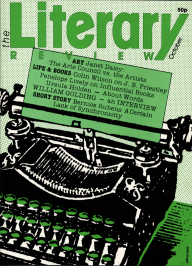John Mole
The Literary Life
Edward Thomas, A Language not to be Betrayed (Selected Prose)
By Edna Longley (ed)
Carcanet 290 pp. £9.95
For Edward Thomas the literary life was addictive and an anathema. Many of us, I suspect, have discovered this in the same way; that is, by turning to his correspondence and to the autobiographies of his wife and Eleanor Farjeon after having been intimately moved by the poems. We have retraced the steps towards a destination, out of a curious feeling of kinship, and experienced a journey marked by passion, melancholy; frustration, extreme generosity, violent outbursts, candour and integrity. A life strangely complete in its profound restlessness, and of which the poetry is both the essence and the redemption.
What even the most cursory biographical browsing suggests is that the paradox of Thomas's nature was intensified by, and probably chose, the sheer weight of his freelance literary activity. He moaned endlessly about the commissions he needed in order to be able to pay the bills, and often disparaged them

Sign Up to our newsletter
Receive free articles, highlights from the archive, news, details of prizes, and much more.@Lit_Review
Follow Literary Review on Twitter
Twitter Feed
Under its longest-serving editor, Graydon Carter, Vanity Fair was that rare thing – a New York society magazine that published serious journalism.
@PeterPeteryork looks at what Carter got right.
Peter York - Deluxe Editions
Peter York: Deluxe Editions - When the Going Was Good: An Editor’s Adventures During the Last Golden Age of Magazines by Graydon Carter
literaryreview.co.uk
Henry James returned to America in 1904 with three objectives: to see his brother William, to deliver a series of lectures on Balzac, and to gather material for a pair of books about modern America.
Peter Rose follows James out west.
Peter Rose - The Restless Analyst
Peter Rose: The Restless Analyst - Henry James Comes Home: Rediscovering America in the Gilded Age by Peter Brooks...
literaryreview.co.uk
Vladimir Putin served his apprenticeship in the KGB toward the end of the Cold War, a period during which Western societies were infiltrated by so-called 'illegals'.
Piers Brendon examines how the culture of Soviet spycraft shaped his thinking.
Piers Brendon - Tinker, Tailor, Sleeper, Troll
Piers Brendon: Tinker, Tailor, Sleeper, Troll - The Illegals: Russia’s Most Audacious Spies and the Plot to Infiltrate the West by Shaun Walker
literaryreview.co.uk